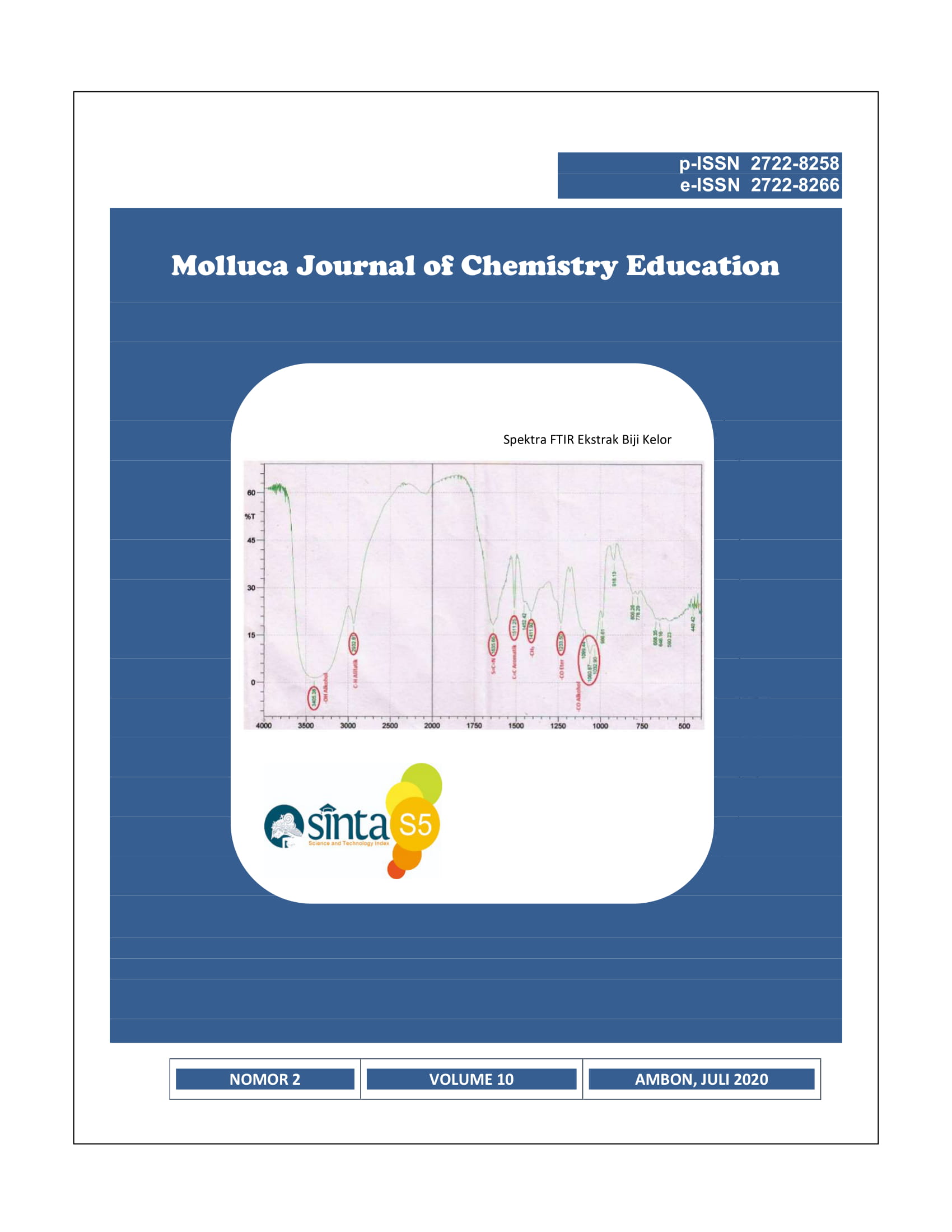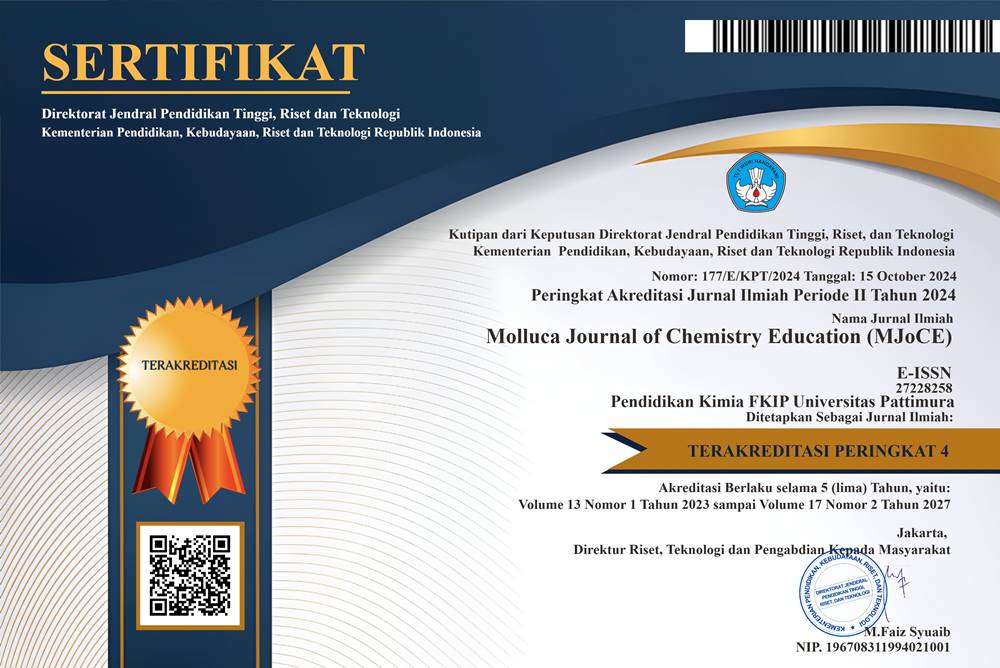Strategi Strategi Konflik Kognitif Dapat Mereduksi Beban Miskonsepsi Mahasiswa Calon Guru Kimia Pada Konsep Ikatan Kimia
Strategi Konflik Kognitif Dapat Mereduksi Beban Miskonsepsi Mahasiswa Calon Guru Kimia Pada Konsep Ikatan Kimia
Abstract
The concept of chemical bonds is often understood in a misconception by some students which causes the understanding of misconceptions also occurs in advanced chemical concepts. The research objective is to reduce the misconception burden of chemistry teacher candidates on the basic concepts of chemistry using cognitive conflict strategies. Case study research using qualitative methods with 10 students as research subjects obtained through misconception detection tests using the three tier test method. Research data obtained using data triangulation (observation, documents, and interviews). The results obtained indicate that the cognitive conflict strategy has succeeded in changing the cognitive structure (schemata) of individual students, causing changes in the burden of high misconceptions to low and understanding misconceptions (MK) to know the concept (TK). Future studies can use cognitive conflict strategies on other chemical concepts with high or low misconceptions.
Konsep ikatan kimia sering dipahami secara miskonsepsi oleh sebagian mahasiswa yang menyebabkan pemahaman miskonsepsi juga terjadi pada konsep-konsep kimia lanjutan. Tujuan penelitian, yaitu mereduksi beban miskonsepsi mahasiswa calon guru kimia pada konsep-konsep dasar kimia menggunakan strategi konflik kognitif. Penelitian studi kasus menggunakan metode kualitatif dengan 10 mahasiswa sebagai subjek penelitian yang diperoleh melalui tes pendeteksi miskonsepsi menggunakan metode three tier tes. Data penelitian diperoleh menggunakan triangulasi data (observasi, dokumen, dan wawancara). Hasil penelitian yang diperoleh menunjukakan strategi konflik kognitif berhasil merubah struktur kognitif (skemata) mahasiswa secara individu, menyebabkan terjadi perubahan beban miskonsepsi tinggi menjadi rendah dan pemahaman miskonsepsi (MK) menjadi tahu konsep (TK). Penelitian selanjutnya dapat menggunakan strategi konflik kognitif pada konsep-konsep kimia yang lain dengan beban miskonsepsi tinggi maupun rendah.
Downloads
References
Arslan, H.O., Cigdemoglu, C., and Moseley, C. (2012). “A Three-Tier Diagnostic Test to Assess Pre-Service Teachers’ Misconceptions about Global Warming, Greenhouse Effect, Ozone Layer Depletion, and Acid Rain.†International Journal of Science Education. Vol.34 No.11, pp.1667–1686.
Barke, H.D., Al Hazari, and Yitbarek, S. (2009). Misconceptions in Chemistry. Berlin: Springer Link.
Black, A.A., 2005, An Instrument for Testing Earth Science Misconceptions and Conceptual Difficulties: Development, Field Testing and Results, in preparation for publication.
Chakraborty, A. and Mondal, B.C. (2012). “Misconceptions in Chemistry At IX th Grade And Their Remedial Measuresâ€. Indian Streams Research Journal. Vol 2, Issue. 7, Aug 2012.pp.1-9.
Hans-Dieter, Barke Al Hazari, Yitbarek S. (2009). Misconception in Chemistry. Addressing Perception in Chemical Education Spinger-Verlagi Berlin Haidelberg. Universitas Munster Germany and University of Tennessee USA.
Kolomuc, A., and Tekin, S. (2011). “Chemistry Teachers’ Misconceptions Concerning Concept of Chemical Reaction Rate.†Eurasian: Journal Physics and Chemistry Education. Vol.3 No.2, pp.84-101.
Lemma, Abayneh. (2013). A Diagnostic Asessment of Eighth Grade and Their Teacher’ Misconseption about Basic Chemical Concepts. AUCE, 3(1), 39-59.
Pesman, H., and Eryilmaz, A. (2010). “Development of a Three-Tier Test to Assess Misconceptions about Simple Electric Circuits.†The Journal of Educational Research. Vol. 103, pp.208-222.
Posner, G. J., Strike, K. A., Hewson, P. W. (1982). Accommodation of a Scientific Conception: Toward a Theory of Conceptual Change. Departement of Education, Cornell University, Ithaca. New York.
Sheehan M., Peter E.C., Hayes S. (2014) The Chemical Misconceptions of Pre-service Science Teachers at the University of Limerick: Do they change. Departement of Chemical and Enviromental Science & National Centre for Excellence in Mathematics and Science Teaching and Learning. University of Limerick. Ireland.
Unal S., Costu B., Ayas A. (2010). Secondary School Students’ Misconception of Covalent Bonding. Journal of Turkish Science Education.
Copyright (c) 2020 Molluca Journal of Chemistry Education (MJoCE)

This work is licensed under a Creative Commons Attribution-NonCommercial-ShareAlike 4.0 International License.





